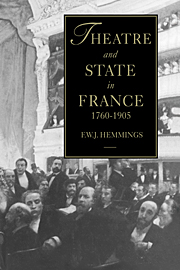Book contents
- Frontmatter
- Contents
- Chronology
- Introduction
- 1 The royal theatres of the ancien régime
- 2 The rise of the commercial theatre
- 3 Dramatic censorship down to its abolition
- 4 The liberation of the theatres
- 5 The royal theatres under the Revolution
- 6 The theatre in the service of the Republic
- 7 Re-establishment of the state theatres
- 8 Curbs on the commercial sector
- 9 Politics and the pit
- 10 The theatre in the provinces
- 11 The licensing system, 1814–1864
- 12 The state-supported theatres in the nineteenth century
- 13 The theatre in crisis: competition from the café-concert
- 14 Dramatic censorship in the nineteenth century
- 15 The private sector
- Notes
- Bibliography
- Guide to further reading
- Index
5 - The royal theatres under the Revolution
Published online by Cambridge University Press: 31 October 2009
- Frontmatter
- Contents
- Chronology
- Introduction
- 1 The royal theatres of the ancien régime
- 2 The rise of the commercial theatre
- 3 Dramatic censorship down to its abolition
- 4 The liberation of the theatres
- 5 The royal theatres under the Revolution
- 6 The theatre in the service of the Republic
- 7 Re-establishment of the state theatres
- 8 Curbs on the commercial sector
- 9 Politics and the pit
- 10 The theatre in the provinces
- 11 The licensing system, 1814–1864
- 12 The state-supported theatres in the nineteenth century
- 13 The theatre in crisis: competition from the café-concert
- 14 Dramatic censorship in the nineteenth century
- 15 The private sector
- Notes
- Bibliography
- Guide to further reading
- Index
Summary
Over the closing decade of the eighteenth century, the three privileged theatres that had formerly functioned under the protection of the monarchy were, as one might expect, subjected to every kind of pressure from the shifting currents of government policy during these ten years. They all suffered, though in different degrees: the Académie Royale de Musique and the Comédie-Italienne struggling through, the Comédie-Française torn asunder and temporarily disappearing under the waves. All three were still seen as state theatres, with the special responsibilities which that status involved; but, with the downfall of the monarchy, and the fluctuating fortunes of the administrations that succeeded one another for the rest of the century, they all felt tempest-tossed in the absence of a reliable sheet-anchor. Even the old names their houses had borne from time immemorial disappeared: the Théâtre-Français became the Théâtre de la Nation, the Théâtre-Italien was renamed the Théâtre de l'Opéra-Comique National, and the Opera was known initially as the Théâtre des Arts and later as the Theatre de la République et des Arts.
The reputation of the Paris Opera in the first year of the Revolution stood high both in France and abroad. A German visitor in 1790 noted that ‘the French are proud of their dancers, their Vestris, their Gardel, their Pérignon, and the whole world acknowledges that nowhere can one see finer ballets than in Paris. They are proud of their orchestra too; and in what other opera house will you find such unison in a group of eighty practised players, who all handle their instruments with such delicacy of touch?’
- Type
- Chapter
- Information
- Theatre and State in France, 1760-1905 , pp. 64 - 91Publisher: Cambridge University PressPrint publication year: 1994



